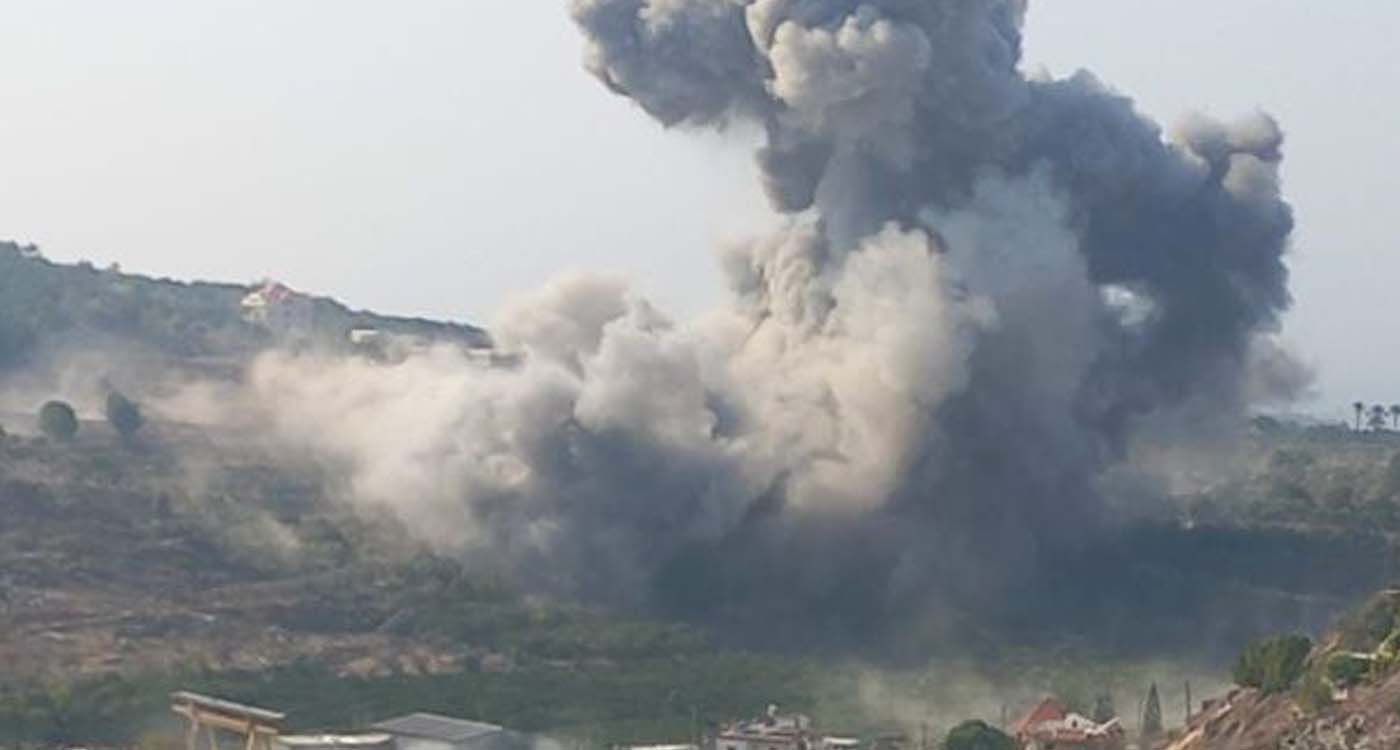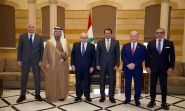
Tensions rose sharply in southern Lebanon on Thursday as the Israeli army launched a series of air raids hitting alleged Hezbollah targets in several villages.
In the late afternoon, the town of Kfardunin (Bint Jbeil) was targeted after the Israeli army issued a warning to residents located near the building that was hit, located about ten meters from a Lebanese Army post.
The raids followed evacuation warnings to residents of specified buildings in the villages of Aita al-Jabal, Taybeh, Tayr Debba, and Zawtar al-Sharqiya. The ministry of Health reported one injury in Tayr Debba.
On his X account, Israeli army spokesperson Avichay Adraee posted maps of the designated areas, urging civilians to distance themselves 500 meters from buildings which he said are “Hezbollah military infrastructure.”
Israeli raid on the town of #Zawtar al-Charkiyeh (Nabatiyeh). pic.twitter.com/fXnpakfhgq
— This is Beirut (@ThisIsBeirut_) November 6, 2025
The strikes triggered a growing displacement movement from villages across the caza of Tyre, as panic-stricken residents evacuated areas perceived to be at risk of further escalation.
Earlier on Thursday, one person was killed and three others were injured in an Israeli airstrike on the area between Burj Rahhal and Abbasiyeh, also in the Tyre district. The victim was later identified as Ahmed Muhammad Jaafar (known as Abu Ali). The raid sparked panic among schoolchildren in Maaraka, Abbasiya, Tura, and Tyre, as ambulances rushed to the site.
Following the strike, Adraee said the target was a facility operated by Hezbollah, describing it as “infrastructure used to produce equipment for reconstructing sites destroyed during the war.”
An Israeli drone also targeted a motorcycle in Ain Qana and dropped a bomb along the Ras al-Naqoura coastline.
Israeli warplanes were also reported flying over Hermel and northern Bekaa villages, while Tyre experienced heavy reconnaissance overflights throughout the morning.
Israel and Lebanon agreed to a ceasefire in November last year, under a deal backed by the United States, France and international mediators, but Israeli strikes on Hezbollah have continued as it accuses the group of trying to rebuild its forces.
"We will not allow Hezbollah to rearm themselves, to recover, build back up its strength, to threaten the state of Israel," Israeli government spokeswoman Shosh Bedrosian told reporters, accusing the group of "continuous terrorist activities."
Due to the intensification of Israeli airstrikes, several of which targeted areas near public and private schools in the districts of Tyre and Nabatiyeh, most schools and universities in the Nabatiyeh region, as well as villages hit by the raids in the Tyre area, announced the suspension of classes for Friday.
Israel warned last week it could intensify operations in Lebanon against Hezbollah and Prime Minister Benjamin Netanyahu has accused the group of trying to rearm, after it suffered staggering losses in the last war.
President Aoun Condemns the Escalation
In response to the escalation, President Joseph Aoun firmly condemned what he described as a “full-fledged crime,” stressing that it constitutes not only a violation of international humanitarian law – which prohibits targeting and terrorizing civilians – but also a “heinous political crime.”
“Each time Lebanon expresses its openness to a peaceful negotiation process to resolve pending disputes with Israel, the latter intensifies its aggression against Lebanese sovereignty, openly disregards UN Security Council Resolution 1701, and continues to violate the ceasefire agreement,” he said. Nearly a year after the agreement came into effect, “Israel has continued to demonstrate its rejection of any negotiated solution between the two countries,” the head of state added.
“Your message has been received,” he concluded.
The Army Command stated on Thursday evening that the Israeli strikes “are reprehensible and part of the enemy’s destructive policy, which seeks to undermine Lebanon’s stability, expand destruction in the South, prolong the war, and maintain the threat against the Lebanese, while preventing the full deployment of the army in accordance with the ceasefire agreement.”
“Furthermore, the Command confirms that the army continues to maintain close coordination with the United Nations Interim Force in Lebanon (UNIFIL), and that the partnership between the two sides remains based on a high level of trust and cooperation,” the statement added.
The United Nations Interim Force in Lebanon (UNIFIL) also condemned the latest Israeli airstrikes, describing them as “clear violations of Security Council resolution 1701.” The mission said the attacks came as “the Lebanese Armed Forces are undertaking operations to control unauthorized weapons and infrastructure in the south Litani area.”
UNIFIL warned that “any military action, especially on such a destructive scale, threatens the safety of civilians and undermines the progress being made toward a political and diplomatic solution.” Peacekeepers, it added, “continue to support both Lebanon and Israel in their implementation of resolution 1701,” and remain “on the ground with Lebanese soldiers, working to restore stability in south Lebanon.”
Calling on Israel “to immediately cease these attacks and all violations of resolution 1701,” UNIFIL also urged “Lebanese actors to refrain from any response that could inflame the situation further.” The mission stressed that both sides must “adhere to their obligations under resolution 1701 and to the understanding reached in November,” warning that failure to do so could “put the current hard-won progress at risk.”



Comments